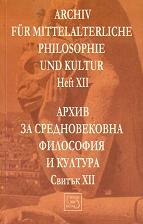Political Philosophy as an Interpretative View and Conceptual Model (Michael of Ephesus and Gemistus Plethon)
Political Philosophy as an Interpretative View and Conceptual Model (Michael of Ephesus and Gemistus Plethon)
Author(s): Smilen Markov, Tzvetan PavlovSubject(s): Philosophy
Published by: Издателство »Изток-Запад«
Keywords: political philosophy; Michael of Ephesus; Gemistus Plethon; medieval philosophy; Byzantine philosophy; neoplatonism
Summary/Abstract: This study does not pretend to be thorough. It is an attempt on comparative analysis of the views expressed by two of the most important representatives of political thought in Byzantium. Michael of Ephesus tackles several topics – sovereignty, power, administration, constitution, morality – that are examined by Aristotle in his work Politics. The interpretation refers to the problems of social and institutional structure of the polis (the state). The commentary of Michael follows the conceptual perspective of Aristotle’s paradigm. The conceptual model of Gemistus Plethon, on the other hand, is a theoretical invariant of the geo-political situation on the Peloponnese Peninsula in the beginning of the XV-th century. Plethon’s model reproduces a reversive type of organization. It introduces criteria for social affiliationthatdifferentiatesthespheresofapplicationofsocial,economic, legal and political relations. The dialectical correspondence of these relations is realized through the principle of disposition.
Journal: Архив за средновековна философия и култура
- Issue Year: 2006
- Issue No: 12
- Page Range: 21-34
- Page Count: 14
- Language: English
- Content File-PDF

